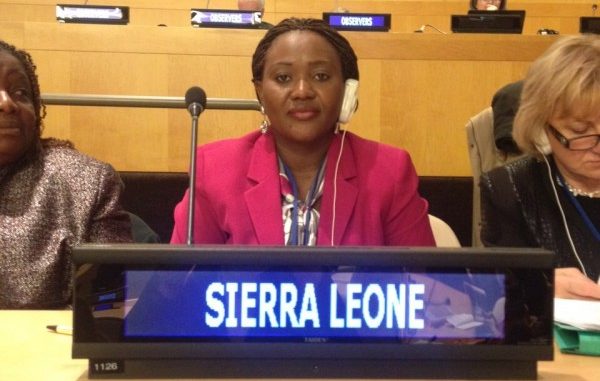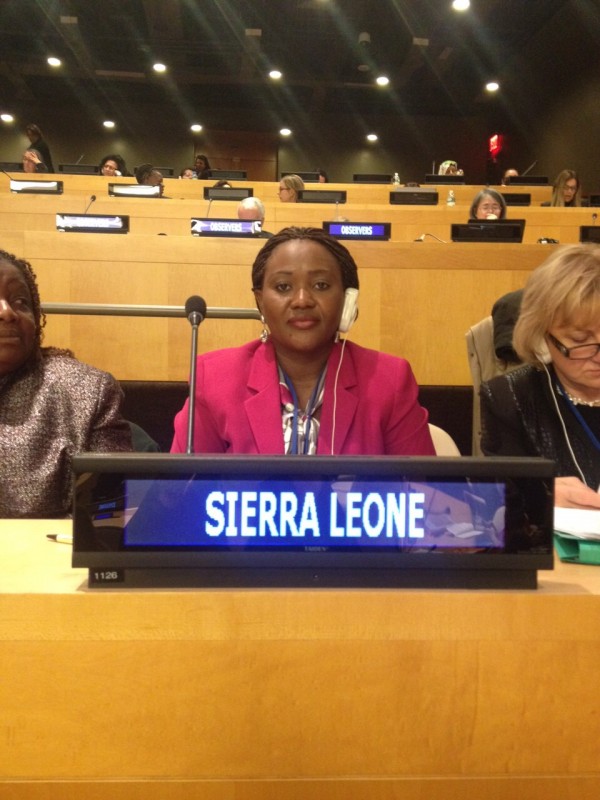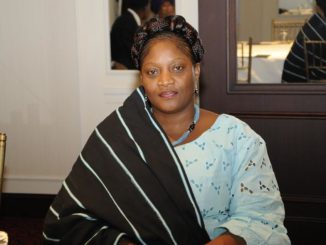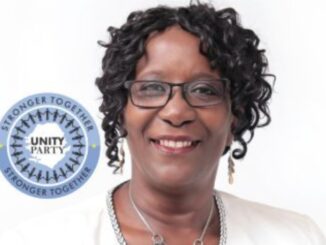
The Hon. Rosaline Smith of Constituency 103 in the Western Urban, is one of Sierra Leone’s delegates at the 59th Session of the Commission on the Status of Women ( CSW ) , presently going on at the United Nations in New York.
During the present session, the Hon. Smith was a member of a panel which consisted of a Moroccan, two MPs from the British Parliament , a representative of the International Parliamentary Union ( IPU ) and a Namibian, who acted as the Chairlady. The panel considered how Parliament relates with civil society, the youths and the grassroots.
On March 10, 2015 the Hon . Smith addressed a side event held by the International Parliamentary Union ( IPU ) , on the topic : EMPOWERING THE NEXT GENERATION : Paving the way for young women in decision-making ” .
We bring you the address :
_____________________________
Mr. Chairman,
Representatives of the IPU and other UN Agencies,
Colleague Members of Parliament,
Members of various Women’s Groups,
NGOs, Civil Societies and Women’s Groups,
Distinguished Ladies and Gentlemen,
I bring you warm greetings from the women and girls of Sierra Leone, specifically those who survived the Ebola Virus Disease (EVD) and those currently in quarantined homes.
I am honoured with this opportunity to share my personal experience as a young female parliamentarian in a male dominated parliament. I must thank the organizers for convening this event and I am particularly delighted to meet with so many women and men from around the world who have made achieving gender equality and promoting women’s empowerment a priority.
Sierra Leone has a population of about six million people, about 52% of which are women. Our 124-member Parliament comprises 12 Paramount Chiefs and 112 ordinary members. It saddens me to state here that we have only 15 women in our current parliament, which is a mere 13.3% female representation. However, the good news is that the current government has made significant progress in promoting women’s empowerment and gender mainstreaming programs in both the formal and private sectors. In recent times, the country has set out policies and mapped out structures that continue to enhance the status of women across the board. Though there are still many challenges, I firmly believe that with demonstrated political will and commitment, sustained collaboration with the relevant stakeholders as well as the increasing awareness, resilience and perseverance by our women folk, we are on track in achieving the goals contained in the Beijing Declaration and Platform for Action.
Mr. Chairman ,
For most people, getting into politics usually springs from being born into a political or wealthy family. For me, though from a poor family background, I got my inspiration from the values I inculcated from my late mother, by the way she cared for our community members who were not even blood related to her. Additionally, people who usually make donations to charitable organizations equally fascinated me. In that connection, I have made a lot of endeavors in the area of charity and community development projects such as awarding of scholarships, construction of water wells, foot-bridges over dangerous waterways, donation of furniture to schools and active participation in grass-root development organizations. All of these did not only earn me recognition by the political leadership at both local and national levels, but also motivated the voters to elect me as their Parliamentary Representative.
Mr. Chairman , Distinguished Delegates :
Women form the majority of voters in Sierra Leone and in that respect we need our voices to be heard; we need significant political space and opportunity to contribute in governance. Unfortunately, we have huge challenges, particularly with regard to the provision of the much-needed financial resources, the unwillingness of political parties to give women proportionate space and the absence of adequate encouragement from our male counterparts to forge ahead with our political aspirations. Although women are the backbone of political groups, we still remain limited in our political representation to the extent that a good number of our women are merely playing the roles of campaigners and voters. Less attention is paid to women’s voices, their experiences, their values and their political demands. The desired change of this attitude and situation must start with our political parties, otherwise it will be difficult to achieve the minimum 30% quota in a male dominated society and its parliament.
There has been a lot of advocacy for the need to increase female representations to elective positions towards attaining the minimum 30% quota. This increase, as we are all aware, will not only provide increased opportunity but also raise the level of confidence of women in advocating and actively contributing in policy decision making on issues directly affecting their lives. I am pleased to state that some encouraging progress is being realized in my country, in the area of appointment of women to policy decision making positions in the Executive, Legislative and Judicial arms of government, as well as in the university, the Army and the Police. This development provides motivation and inspiration for our younger female generation. Our own generation MUST ensure the enhancement of further progress in this direction for the benefit of posterity.
Mr. Chairman , Distinguished Delegates,
I will not conclude my presentation without talking about the Ebola outbreak in our sub-region and its attendant consequences on the development and empowerment of women, with specific reference to Sierra Leone.
Despite progress made in the last several years, maternal mortality is still a key challenge in the entire healthcare system. This has been compounded by the outbreak of the Ebola virus, which continues to threaten the health of women and their families. Women have been the most affected by the disease, largely owing to the fact that they are the primary caregivers in their families and are the majority of healthcare personnel. The magnitude of the outbreak has pushed the already fragile health system beyond its limits, making access to health care of any type even more difficult.
Ebola appears to be very dangerous for pregnant women, not only because uninfected women are unable to gain access to health centers for routine antenatal or delivery care, but also because pregnant women who contract but survive the disease are highly likely to suffer miscarriage.
Mr. Chairman , Distinguished Delegates,
Let me conclude by calling on all our development partners to recommit ourselves, collectively, to further strengthening our existing partnerships and networks so we could bequeath a legacy of equal opportunity and a level playing field for our younger generation to find the required space to collaborate with their male counterparts as equal partners at the school and university, in the workplace as well as in all sectors of governance.
THIS IS ACHIEVABLE and, with firm determination, WE CAN DO IT. We should not wait for the space to be given to us; WE MUST CARVE OUT OUR SPACE. YES, WE CAN AND WE MUST!!
LET US BE GO-GETTERS.
I thank you for listening




